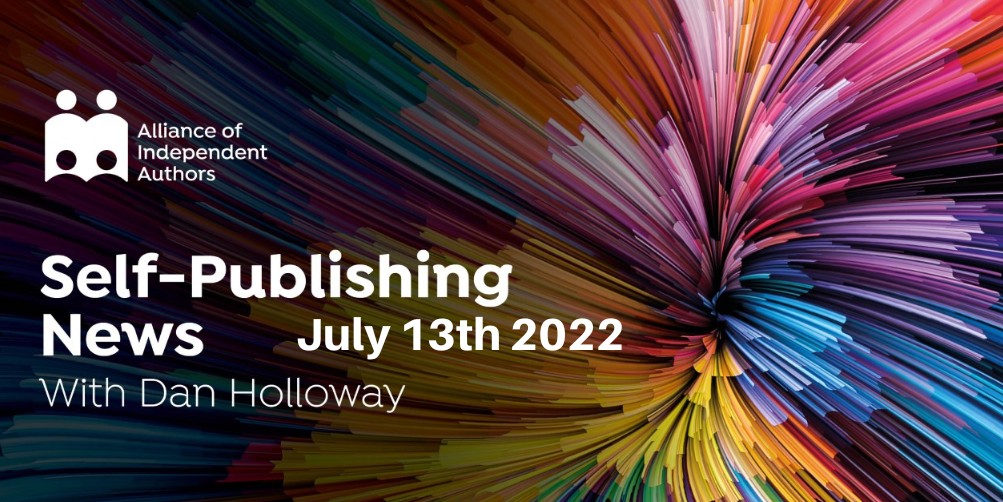In this week's Self-Publishing News Special, ALLi News Editor Dan Holloway looks at the International Publishers Association’s new InSPIRe report, which outlines a vision of the future uniting authors and publishers.

ALLi's News Editor Dan Holloway
This month's Self-publishing News Podcast is just out. You can listen here. Howard and I take a deep look at one of the issues that features again in this week's news and will keep coming back: AI-generated narration. This week's #indieauthorchat is tonight, Wednesday 13 July, at 8pm UK time, 3pm Eastern Time. Tim will be asking whether word of mouth really exists.
International Publishers Association InSPIRe Plan Sets out a Vision of Publishing's Future
Last week saw the release of the International Publishers Association’s new report on its InSPIRe initiative. This stands for International Sustainable Publishing and Industry Resilience.
It’s really encouraging that this report consulted with ALLi. The report comes from within and addresses the traditional publishing industry. But it is outward-looking and seems to promise genuine engagement with and inclusion of authors and rights holders in its vision of the future the industry needs to create. We are, so it seems, no longer on the outside of a monolith that thinks of itself apart from us. Rather, we are part of a large ship that wants to be nimble in navigating difficult waters.
The report commits to a series of long-term goals, which you can find here. Interesting among those for this week’s news is the commitment to fight piracy. But the really interesting part for me is the section of the report labelled “opportunities.” Because the three bullet points there are the most obvious statement in the whole piece—that all our destinies are tied together. Here they are in full
- Train publishing ecosystem players on emerging digital sales, distribution, licensing, piracy mitigation, and publishing strategies and use cases for artificial intelligence and Web3
- Build stronger partnerships with authors, distributors, other creative industries, and governments to support industry technology adoption and co-develop mutually beneficial use cases for disruptive technologies
- Adopt enhanced technologies and emerging decentralized strategies to fairly compensate content creators and rights holders to prepare for the rise of Web3
It's interesting just how much these opportunities reflect details of ALLi's Self-publishing 3.0 model.
Ingram Enters Wholesale Market in UK and Opens a Massive Print on Demand Factory in Sharjah
Wholesalers are the means by which, by and large, we get our books into bookstores. In the UK, we have been reliant on Gardners as the only real game in town since Betrams went under a couple of years ago. Now Ingram is to enter the wholesale market. In theory, this sounds as though it should mean it becomes easier to get our books to booksellers if we print through Ingram Spark's print on demand. As soon as they say more about how things will work in practice, we'll know if that's really the case.
Meanwhile, Ingram has opened a huge print on demand factory in Sharjah. This will be part of the state's Publishing City, a free trade zone dedicated to the publishing business. The factory will have 24-hour turnaround times and will serve the smallest clients to the largest.
Publishers and Libraries: Legal Hostility Reignites
Libraries and Publishers have been locked in some pretty heated engagements in recent years. The most high profile of those was the argument over the price publishers charge to libraries for ebooks. Publishers started hiking this price. Libraries took that badly. In the end, State legislatures in the US got involved, passing bills in Maryland and New York to make publishers offer ebooks to libraries on better terms. Publishers took that badly and took those legislatures to federal courts. And in some cases have won.
Internet Archive and publishers both seek summary judgement to resolve their dispute
But that’s not the only argument. Publishers and author groups have campaigned vigorously against The Internet Archive for some time now. In the early days of Covid there was a truce as people thought The Internet Archive suspending its “one title, one loan” policy was a good thing. A few months down the line, in June 2020, publishers returned to their previous position that where titles appeared in The Internet Archive’s catalogue without consent, no loans should be permitted. Harper Collins, Hachette, Wiley, and Penguin Random House started legal proceedings for copyright infringement.
This week, the publishers asked for a summary judgement to save further delays. They argue that the international reach of the Internet Archive’s “Open Library” is so great that it poses a serious threat to income that can’t be ignored any longer. The Internet Archive has also filed for a summary judgement. It argues that what it does falls under fair use.
The root of the difference is the same in both these disputes and consists of a question. Do library ebook loans detract from ebook sales? There are, certainly, other points of principle at stake on both sides. But the arguments focus on this point because it would make tangible the impact on rights holders. The actual evidence of such an impact is something we’re still waiting on. But if there is a summary ruling in the absence of that evidence, there will be significant ramifications.
PublishDrive Looking for a Brand Ambassador
When I spoke to Kinga Jentetics at the Self-publishing Show, she told me that PublishDrive are looking for a new brand ambassador. And while the position requires technical expertise, she suggested that authors who really know their stuff, and their peers, might be ideally suited to the post. So if you think this could be you, do check out the details.
Self-publishing News: Ingram Will Enter UK Wholesale Business Share on X
Upcoming Conferences and Events
Bay Area Independent Publishers Association (BAIPA) – Zoom meetings the 2nd Saturday of each month




